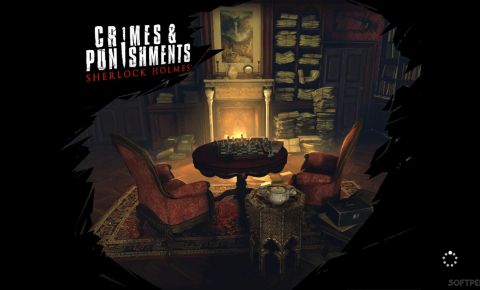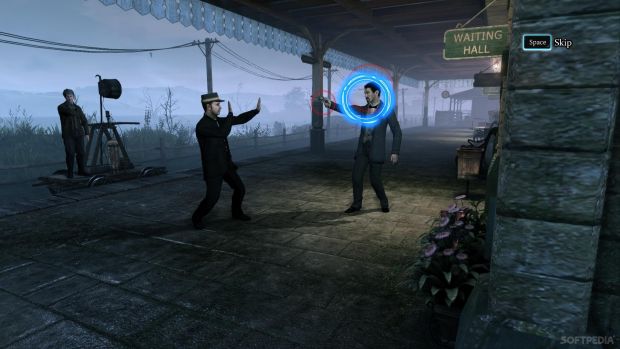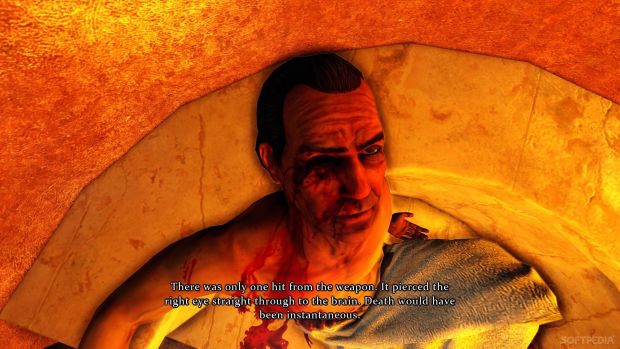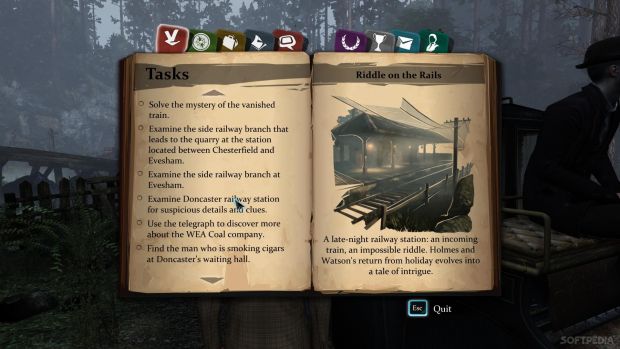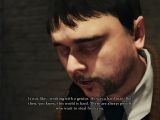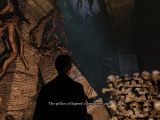Sherlock Holmes and similarly endowed characters tend to exercise an iron grip on our imagination due to the fact that we would all like to be mad geniuses, unique and adulated, and to be able to learn kung fu and fly helicopters faster than Neo did in "The Matrix."
One of the reasons this happens is that our brains are wired to find the path of least resistance in order to conserve resources, and so we constantly yearn for those elusive moments when we get something right from the first try, and we loathe having to practice and work hard in order to gain mastery of a certain skill.
For Sherlock Holmes, it's usually all glamour, as we never get to see him sitting completely alone for three months, doing nothing but reading, in order to gain a better understanding of a certain subject, but instead we only get to see him shine, applying his patented educated guess engine to everyone and getting everything right, no matter how far-fetched the conclusion.
Sherlock Holmes: Crimes and Punishments, the latest entry in Frogwares' long-running series of investigative video games, attempts to introduce us to a number of fresh mysteries to solve, while taking on the role of the prodigious detective.
Gameplay
The game takes place, as expected, toward the end of the 19th century, in London and its suburbs. Developer Frogwares acknowledges the influence that Fyodor Dostoyevsky's famous novel "Crime and Punishment" had over the development of the adventure game, even having the titular character read it during loading scenes.
Sherlock Holmes: Crimes and Punishments focuses on exploring crime scenes and investigating the circumstances around several murders, complete with deciphering various cryptic messages and figuring out the background of those involved and the extent to which they had a hand in the wrongdoings.
Once you discover a clue, it gets added to your journal and to a sort of inductive reasoning minigame, where Sherlock applies his speculation talents in order to derive possible conclusions about what happened and whose fault it had been.
Once you piece the information together, you get a tree of inferences that gradually evolves into a solution for the crime, at which point you can choose to pronounce your verdict or investigate matters further, as you can also get things wrong if you don't pay attention to all the details.
Finding the culprit is usually done through a combination of exposition, scripted dialogue, and investigative work on your part, and the game, of course, also lets you use Sherlock's infamous x-ray vision filter to guess details about the personal lives of the people you meet based on subtle cues that the detective's unparallelled powers of observation can pick up on.
Nothing, from scars and calluses to stains, a focused or arrogant look, or the quality of a person's clothing, escapes the legendary detective.
In addition to this, certain sequences also employ Sherlock's keen sense of perception to glean information that others would overlook while investigating crime scenes, and his vivid imagination to fill in the missing details and see how various items fit together.
No detective work would be complete without a little bit of research, and some clues require that you cross-reference them with your extensive library of newspaper articles and encyclopedias, and you even get to play mad scientist with the chemistry set or experiment in order to test out whether possible hypothesis hold water or not.
In addition to the usual game of playing detective, a very interesting and novel feature added by Frogwares lets you make moral decisions on how justice should be carried, depending on the circumstances that lead to the events. You can choose to be intransigent and blindly follow justice to the letter, or lenient to those who are down on their luck or who inflicted suffering on those who deserved it, and the choice is yours to live with afterwards.
This is a very nice touch that makes the entire half-human-computer half-sociopath simulator feel even more exciting than it usually does, and it also raises the stakes, because you have to make sure that your deductions are solid, so you're not crossing the line when bending the law in accordance with your moral compass.
Unfortunately, some of the puzzles you have to solve aren't all that great, with some being borderline annoying, but thankfully, you get the option to skip past them to the conclusion, if you're not interested in mini-games and other such nonsense, such as dreadful quick time events.
The cases
Crime investigation stories are usually as good as the cases being worked on, and of course, the eccentric detective only picks the cases that spark his interest due to irregular circumstances.
Sherlock Holmes: Crimes and Punishments is the most sophisticated Sherlock game yet, and the cases you have to solve are pretty interesting, especially in the way they are rendered.
You get to prance around Victorian-era London and its surroundings, taking in the view, coming in contact with a lot of people, following stories that harbor secrets, always have an extra layer of complexity that goes beyond Inspector Lestrade's first hunch about who is to blame for the mysterious murders you're investigating.
The first case looks pretty straightforward: a rich, retired whaler is found dead, pinned to the wall by a harpoon, the very weapon that brought his fortune. Three possible culprits catch your eye, and you have to determine whether the wife's lover, a former employee who knows a damning secret, or an impoverished son looking for justice is responsible for the murder.
Of course, things start getting more complex than a straightforward drunken brawl, and you uncover the details behind each of the three's stories, as well as disturbing facts pertaining to the dead man's past.
“The details you uncover get you excited and hooked, you want to find out more, and the brilliant mix of narrative exposition and adventuring makes the whole experience feel immersive”
I don't want to give out any information related to the stories, as discovering them is a pretty big part of the entire experience. All the cases are similar in nature in this aspect: you always discover more, a very well fleshed-out narrative that makes them feel like they are a small slice of actual life.
The details you uncover get you excited and hooked, you want to find out more, and the brilliant mix of narrative exposition and adventuring makes the whole experience feel immersive, like you're really there, following the great detective's moves and logic.
However, die-hard fans of adventure games might find that the lack of a solid over-arching story diminishes their enthusiasm, as does the constant hand-holding.
I liked the fact that everything is streamlined and you always know when to use stuff and where, such as highlights for using Sherlock's heightened perception view, because that means that you don't waste any time with tedious guesswork.
I abhorred some of the seemingly random item combinations from classic adventure games, where at various points you literally tried to use every single thing in your inventory on pretty much every highlighted background object in hopes that it would solve the awkward logic behind the progression trigger, so Crimes and Punishment felt more like a sort of interactive movie.
In that sense, if you're a fan of hitting your head against the wall while trying to get some elusive item, you'll find this Sherlock game disappointing, as you pretty much find every clue from the first pass.
It's pretty accessible and it has a greater focus on story-telling than on puzzle-solving, and it's also pretty well cordoned off.
You won't find yourself freeroaming or exploring the map, as the experience is focused on the points of interest, and you won't lose any time wondering whether you might have missed anything.
All in all, I found the cases pretty interesting and varied, even if there is nothing truly surprising about them, and I found the focus on narrative and mystery more than on puzzle-solving very fitting.
They are pretty grounded, which I thought to be refreshing, because I don't like over-the-top impossible scenarios or Dragon Ball Z-style childish drama, and much prefer the more mundane but palpable stories about human nature and circumstance.
Oh, and some of them are based on the actual stories that Arthur Conan Doyle wrote, and it's a really fun experience to see them in the flesh, so to say. It really seems like the developers followed Doyle's canon when assembling the game.
Sound and visuals
The snazzy visuals are a big part of the whole package, as everything looks much better than I would have expected from a Sherlock Holmes game.
Sure, there are plenty of hitches, the invisible walls around the environments you're exploring are never subtle, animations are a bit sketchy, and object collisions aren't always perfect, but overall, Sherlock Holmes: Crimes and Punishments looks very good.
You can pick up on the details that Sherlock picks up on, from stains on clothing to dirt particles under finger nails, and seeing the detailed expressions on the faces of those you interrogate when you show off your skills also adds to the feeling that you're the best detective that ever was.
The music is also used to great effect, accompanying your every step and contributing to the tense atmosphere of you going around town and solving murder cases, finding out who did what and why, and getting to decide whether it was justifiable or not.
All the dialogues are voice-acted pretty well, and there are a lot of them, due to the focus on narrative exposition, which is really nice and adds to the overall quality of the experience.
Another interesting aspect is the fact that the cases based on actual stories offer reading fans of Sherlock the chance to explore a more visually stimulating and interactive experience.
The Good
- Interesting and realistic cases
- Solid visuals
- Narrative focus
- It feels like a great detective game
- Streamlined gameplay systems
The Bad
- Very long loading times
- Quick time events
- Watson is useless
Conclusion
The mechanics themselves are innovative and modern, and the fact that the game is streamlined and accessible scores it some extra points.
It's not a straight-up point-and-click adventure game and feels overall very cinematic, which means that adventure fans looking for something slightly different can also give it a go.
It's challenging through the choices you have to make, and not through the difficulty of its puzzles, and doesn't make you jump through any hoops. It sometimes feels more like an interactive novel, but it makes you genuinely think about what's going on, and do a bit of guesswork yourself, due to the fact that the answers aren't always clear-cut, and even after you make your choice, you're left wondering whether or not it was the good one.
 14 DAY TRIAL //
14 DAY TRIAL // 